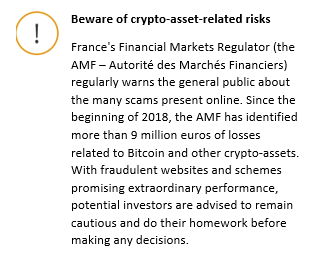
Did you say "Crypto"? – 2: Crypto-addicts: geeks, hackers and billionaires?
The world of cryptocurrencies has produced some big winners over the past decade. Is it an El Dorado?
There is no sure answer... In February this year, Forbes Magazine published the first list of "The Richest People In Cryptocurrency". Among those on the list are:

Source: https://steemit.com/fr/@grandpere/les-cryptos-riches-chris-larsen
Chris Larsen, (@chrislarsensf), co-founder and Executive Chairman of Ripple, the third-ranking cryptocurrency in terms of market capitalization, behind Bitcoin and Ethereum, tops the list.
His fortune has been estimated at approximately USD 8 bn, after reaching nearly USD 60 bn in January when Ripple's price was at its peak.

The Chinese-Canadian business executive Changpeng Zhao, aka "CZ" (@cz_binance). Aged 41 years old, he was featured on the cover of an issue of Forbes Magazine on "Crypto Billionaires". He built his fortune (estimated at between 1.1 and 2 billion US dollars) in just seven months. He is the founder of Binance, the world's top cryptocurrency exchange platform. In August, Binance and Liechtenstein Cryptoassets Exchange (LCX) announced a?partnership?(joint-venture) to found Binance LCX, an exchange platform between cryptocurrencies and fiduciary money (or fiat money).
The Winklevoss twins (aged 36 years), who were brought to fame with their appearance in the film The Social Network about the creation of Facebook. Early believers in Bitcoin — they invested 11 million US dollars in 2013. (They had just received a 65 million US dollar settlement from Facebook's founder, Mark Zuckerberg, after claiming he stole their idea for a social networking site.)
Their cryptocurrency fortune is currently estimated to be around 1 billion US dollars.

The Winklevoss brothers were among the first to believe in the future of Bitcoin. [CRAIG BARRITT / GETTY IMAGES NORTH AMERICA / AFP]
El Dorado or Wild West?
Bitcoin has a poor, and sometimes even shady, reputation because it is an ideal medium for money laundering and tax evasion and is, therefore, much loved by criminal organisations. The (relative) anonymity of transactions, as well as the absence of controls and borders, is ideal for traffickers: cryptocurrencies combine the advantages of cash and online payment (it should be noted, however, that Bitcoin is not completely anonymous, unlike other cryptocurrencies such as Monero (XMR)).
You may have heard of black markets such as Silk Road that use cryptocurrencies. (A black market on the Darknet that used the Tor network to ensure the anonymity of both buyers and sellers, for the sale of illicit products, in particular narcotics). However, unless you are a "cryptomaniac" or "cryptoaddict", you may not have heard of the sad story of James Howells. This IT worker from the UK got involved in the crypto economy in February 2009. Through his mining work (see next paragraph), he accumulated approximately 7500 bitcoins, which were then worth practically nothing.
Mining has the drawback of being very energy-hungry* and very noisy. The story goes that he gave up Bitcoin mining after his girlfriend complained about the noise produced by his laptop. He later accidentally threw away the hard drive containing the bitcoins (whose value had grown to approximately 75 million euros), and is still trying to find a way to retrieve it from his local landfill site! Another tragic and memorable story from the first decade of cryptocurrencies is the bankruptcy of MtGox: in February 2014, Mark Karpelès, a thirty-two-year-old French engineer, and CEO of the largest global Bitcoin exchange platform, filed for bankruptcy after revealing that 850,000 bitcoins had been stolen by hackers (worth 350 million euros at the time).
In 2017, the South Korean platform Youbit filed for bankruptcy after a second hacking incident. Eight months before, nearly 4000 bitcoins (then valued at an estimated 5.5 billion wons, or 5 million US dollars), which accounted for nearly 40% of its assets, were stolen during a cyberattack blamed on North Korea. Shortly after, the value of the BTC dropped by 3000 US dollars (falling below USD 16,000 from almost USD 19,000 six hours before). In 2018, two Japanese exchange platforms were hacked: following Coincheck, which lost 530 million dollars last January, Zaif was recently targeted. The hack attack reportedly cost it no less than 60 million US dollars. Cryptocurrency prices were not, however, affected by the announcement.
Are cryptocurrencies synonymous with hacking?

The world of cryptocurrencies is a dream for some pirates who receive ransoms in virtual money, while others take advantage of its "portability" to steal it. Similarly to a bearer bond, the holder of the wallet and keys is the only person able to access the assets it contains. While major players such as Coinbase are now able to provide high-security vaults, other players like the French company Ledger (which positions itself as the leading provider of virtual vaults) have created ultra-secure hardware wallets.


In March 2018, Binance created Hacker Bounty with an allocated budget of 10 million US dollars. The "first person to supply substantial information and evidence that leads to the legal arrest of the hackers" will receive a bounty of 250,000 US dollars, paid in Binance Coins (BNB).

Many scammers play on the credulity of some Internet users, with scams abounding on social media platforms such as Twitter. They attract users by posing as well-known figures like Elon Musk (CEO of Tesla). They promise a generous payment in a cryptocurrency if the person first makes a small cryptocurrency transfer to a specific address.

Through analysis of the Ethereum blockchain (the public ledger that keeps track of all Ether transactions), it was shown that the scammer received 83 payments in about 12 hours. The spoils amounted to a total of 52,333 ethers, or 42,801 US dollars.
While Musk initially made light of the scambots by joking about them on Twitter, he no longer hides his annoyance and seems determined to get rid of them. Twitter has introduced a new rule: any person using the name Musk as a pseudonym or impersonating him will be banned from the platform!
A world of geeks with powerful PCs?
Mining is an operation that involves validating a completed transaction by encrypting the data and recording them in a blockchain. Operators, whether private individuals or companies, who use computing power (provided by CPUs or gamer GPUs) to validate a transaction are called "miners". In practice, miners use a software programme to resolve a mathematical problem, which leads to the validation of a transaction.
Cryptographic problems to be solved by mining are becoming increasingly complex, while, in the case of Bitcoin, the amount miners receive in return for their work is diminishing over time: it is halved approximately once every four years (which is referred to as a "halvening").
*Mining is a very energy-hungry activity: Bitcoin mining consumed 30.25 TWh of electricity in 2017, which is greater than the electricity consumption of countries such as Morocco, Lebanon and Hungary, and the equivalent of that of Nigeria (which has 186 million inhabitants). At this pace, it is set to exceed that of Denmark (32TWh) and Qatar (34 TWh)!

RIG MINAGE 10 GPU. Source: Ethereum Community Forum

MINING FARM. Source : Genesis Mining